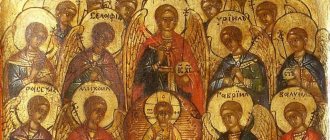1) Prayer of permission - a prayer that the priest says at the end of the sacrament of confession, placing the epitrachelion on the head of the penitent:
“May our Lord and God, Jesus Christ, by the grace and generosity of His love for mankind forgive your child (name), and I, an unworthy priest, by His power given to me, forgive and absolve you from all your sins, in the Name of the Father and the Son and the Holy Spirit. Amen".
2) A prayer read by the priest at the end of the funeral service. It asks the deceased for forgiveness of his sins (permission, release from them).
In the Russian Orthodox Church, according to ancient tradition, a sheet with the text of a prayer of permission is placed in the hand of the deceased. The sheet with the text of this prayer is called a permit, or travel document.
***
When read
The prayer appeal is read in special cases provided for by the Church Charter. Variants of the text are contained in the breviary; the priest chooses the one he needs depending on the circumstances.
Confession before baptism
In the practice of the Russian Orthodox Church, prayer texts are used during confession at the choice of the priest.
It depends on the conditions:
- How often did a woman attend church before giving birth?
- From the severity of sins committed (for example, abortion, adultery, cohabitation, etc.)
In the first case, if there was a long break (a year or more), then a secret prayer is read for reunification with the church and forgiveness of sins. If you regularly visit church and have no serious sins, the rite of ordinary confession with forgiveness of sins.
In case of serious sins in which the woman admits, the third version of the text is read.
At the funeral service
At the end of the funeral service, the priest, after reading the Apostle and the Gospel, reads a prayer for the forgiveness of the deceased’s sins, which he did not have time to repent of or did not remember.
After mother gives birth
Since Old Testament times, the ritual status of a woman after childbirth has been preserved. For 40 days, until postpartum bleeding has completely stopped, she should not begin the Holy Mysteries. But she can attend church: light a candle, pray without kissing icons and the Gospel. At the end of the forty-day period, the priest in the temple reads a cleansing prayer over her.
Currently, the Orthodox Church allows a woman in labor to visit the temple without waiting for 40 days. But before a child’s baptism, reading a cleansing prayer is mandatory.
Pregnancy and childbirth
In the modern world, as before, a pregnant woman is treated with awe and love. They protect her, strive not to enter into conflicts, and give in to everything. But for the temple and religion, a woman expecting her child and a young mother are prohibited. To attend church, a cleansing or permissive prayer to the mother after childbirth must be read, and a certain ritual is performed. Surprised? But it is so. Even when baptizing her baby, before going to the temple, a woman goes through a similar ceremony. Young Christian women who respect the laws of the church must not only use the prayer of permission, but also perform a ritual, which in modern times often contains various errors. To avoid them, contact the priest, he will explain what a woman needs to do after childbirth and what before the baby’s baptism.
Full text in Russian
Contents of prayers:
After the funeral service/mother after childbirth.
“Our Lord Jesus Christ, by His Divine grace, the gift and power given to His holy disciples and apostles, for the remission of the sins of men, said to them: receive the Holy Spirit; if you forgive them their sins, they will be forgiven them; if you hold, they will hold; and whatever you bind and loose on earth will be bound and loosed in Heaven. From them and on us successively, one after another, the grace that came, may the child (name) create through me, the humble one, this forgiveness in the spirit from all those who have sinned against God in word or deed, or thought, and with all their feelings, willy-nilly or involuntarily , knowledge or ignorance. If she was under an oath or excommunication by a bishop or a priest, or if she brought an oath on herself by her father or mother, or falls under her own curse, or broke an oath, or some other sins, how a person became involved, but for all of these she repented with a contrite heart and from those let all the guilt that binds let it be resolved; if for the weakness of nature she gave up to oblivion, may she forgive her, love for mankind for her sake, through the prayers of our Most Holy and Most Blessed Lady Theotokos and Ever-Virgin Mary, the glorious and all-praised apostles and all the saints. Amen".
At confession.
“Our Lord and God Jesus Christ, by the grace and generosity of His love for mankind, forgive you, child (name), all your sins, and I, an unworthy priest, by His power given to me, forgive and absolve you from all your sins, in the name of the Father and the Son and the Holy Spirit. Amen". (Read after confession while the believer observes Christian commandments).
“O Lord, God of the salvation of Your servants, merciful, and generous, and long-suffering, regretting our iniquities, not desiring the death of the sinner, but that he should turn and live; Even now, have mercy on Your servant (name), and give him an image of repentance, forgiveness and remission of sins, forgiving him every sin, both voluntary and involuntary, reconcile and unite him with Your Holy Church in Christ Jesus our Lord, with To whom belongs to Thee the power and splendor, now and always, and unto the ages of ages. Amen". (Read before confession during a long break from visiting church).
Laws for visiting the temple
Most young women cannot come to terms with and understand why it is forbidden to enter the temple “unclean”, as well as with a baby after childbirth. There are religious laws and reasons for this, which true Christians must observe. The prohibitions go in the following sequence:
- Firstly, a woman with bloody discharge after childbirth is considered unclean. At this moment, her body and she herself are cleansed of the consequences of the dirt of sexual contacts, as the Bible says.
- Secondly, the great law is that in the church it is a sin to shed blood in any form. Previously, there were no modern hygiene products, and there was a ban on visiting the temple.
- Thirdly, the health of the mother and her baby can be negatively affected by crowds of people in church. This is especially true during epidemiological periods.
As can be seen from the above, it is not only religious reasons that prohibit attending church on such days. It is better to listen to advice to avoid problems.
Reading rules
Confession takes place in front of the icon of Jesus Christ. The breviary describes the order of confession, which the priest must adhere to. The priest pronounces the secret prayer at the end of the sacrament of confession, covering the head of the penitent with the stole.
At the funeral service, the Orthodox priest reads a prayer of permission and places a sheet with its text (travel letter) in the right hand of the deceased. During the reading, all worshipers are required to bow to the ground three times. During an absentee burial (before or after the funeral), the ceremony is performed in the church according to the same rite. The road map is given to relatives. If it cannot be placed in a coffin, then the attribute should be burned.
Permissive prayer in confession
The sacrament of repentance is a church ritual in which a person confesses his sins to a priest and asks him to forgive them. After a one-sided monologue by the penitent, the priest forgives all sins, and invisible forgiveness from God occurs. At its core, confession is hard mental work. A man bares his soul before the priest - “the servant of the Lord.” How does repentance work?
- The priest says certain prayers that encourage the penitent to sincerely confess his sins.
- A man, kneeling before the lectern where the Gospel lies, voices his sins as before the Lord.
- At the end of confession, the priest covers the head of the repentant with an epitrachelion (embroidered with fabric).
- The permissive prayer of the sacrament of confession is read, thanks to which the priest, in the name of Christ, frees the repentant from his sins.
Repentance for sins helps to cleanse a person’s soul, which results in rapprochement and reconciliation with the Lord.
Prayer read before confession
Confession is a sacrament when a clergyman, endowed with the authority of the Lord, absolves the sin of a repentant person. During confession, a person is forgiven all his sins if he sincerely repents of them. The sinner receives deliverance from eternal punishment and special grace so that after confession he can fight temptations. And prayer before confession helps to get into the right mood.
If you read Christ’s Sermon on the Mount, then you probably remembered the words of the Savior, who cited the conditions for God’s forgiveness of human sins. Only if the sinner himself learns to forgive other people, will the Heavenly Father forgive him his sins. Therefore, you can begin the ritual of repentance only if you first sincerely forgive each of your offenders and debtors, driving away anger from your heart.
In order to receive forgiveness of sins in the sacrament of repentance, the sinner must:
- examine your conscience;
- to sincerely repent of the sins committed;
- become firmly determined to sin no more;
- confess sincerely.
And in order for all of the above points to come into effect, the sinner will be helped by a prayer of permission before confession.
Prayer “Before Confession”
“Come, Holy Spirit, enlighten my mind so that I may become more aware of my sins; motivate my will to genuine repentance for them, to sincere confession and decisive correction of my life.”
What should be the prayers before confession?
Every believer knows that confession is an open confession to the Lord of all sins in order to receive the Lord's forgiveness. If you feel that your soul has become heavy or you have committed a bad act because of which you are suffering, you need to visit church and confess. Only after this you will feel relief and freedom. But in order to undergo the sacrament, you must first familiarize yourself with the rules for its implementation.
Each person who is going to confess is required to undergo prayer training and read certain prayers for confession.
Prayer to the Lord God
“Have mercy on me. God, according to Your great mercy, and according to the multitude of Your compassions, blot out my iniquities. Wash me often from my iniquity, and cleanse me from my sin, for I am aware of my iniquities, and my sin is always before me. You, You alone, have I sinned and done evil in Your sight, so that You are righteous in Your judgment and pure in Your judgment. Behold, I was conceived in iniquity, and my mother gave birth to me in sin. Behold, You have loved the truth in your heart and have shown me (Your) wisdom within me. Sprinkle me with hyssop, and I will be clean; Wash me, and I will be whiter than snow. Let me hear joy and gladness, and the bones will rejoice. Broken by you. Turn Your face away from my sins and blot out all my iniquities. Create in me a clean heart, O God, and renew a right spirit within me. Do not cast me away from Your presence and do not take Your Holy Spirit from me. Restore to me the joy of Your salvation and strengthen me with the Sovereign Spirit. I will teach the wicked Your ways, and the wicked will turn to You. Deliver me from bloodshed. O God, the God of my salvation, and my tongue will praise Your righteousness. Lord, open my mouth, and my mouth will declare Your praise: for You do not desire sacrifice, I would give it; You do not favor burnt offerings. A sacrifice to God is a broken spirit; You will not despise a contrite and humble heart, O God. Bless Zion, O Lord, according to Your good pleasure; build up the walls of Jerusalem: then the sacrifices of righteousness, the heave-hoist and the burnt offering will be acceptable to You; Then they will place bullocks on Your altar.” Read more…
So the repentant sinner will turn to God, regretting the evil he has done.
With the help of a prayer of permission, he will ask God to grant him grace, will be able to sincerely repent and will become more decisive in changing his previous life and in taking the true path.
And in order to repent of sins, it is best to use prayers before and after the sacrament, which the church itself recommends.
How does prayer before confession help?
If you want to repent to God of your sins, you will need preparation for the sacrament. You should start preparing for confession in advance. Before this, read the literature on the sacrament, remember all your sins and write them down on a separate piece of paper. Sometimes this sheet of paper is given to the confessor for review. But the sins that especially burden the sinner’s soul should be spoken out loud.
If you are at enmity with your relatives or neighbors, do not tell what caused this enmity, repent of the very sin of judging your relatives and neighbors.
The list of sins you have committed is not at all important to the confessor and God; it is important that the person truly repents of what he has done and sincerely wants to let Orthodoxy into his life.
After all, repentance is not only a means for realizing one’s own wrongdoings, but also a thirst for cleansing from them.
You cannot justify your crimes on the sacrament itself or before it. Only by hating sin can you achieve forgiveness from the Lord. Every evening, analyze the past day, and repent to God daily with the help of special prayer requests. Make peace with your neighbors. Read the canon of repentance and the prayer of permission during confession, which you will always find in the Orthodox prayer book.
In order to carry out the sacrament, find out on what days in the Temple it will take place. Where the service will be performed daily, the Sacrament of Confession will also be performed. If there is no daily service at the church, check the schedule in advance.
How to pray so that prayer will help?
Today, prayerful preparation for the sacrament can be limited to the thoughtful reading of the prayer for confession “Our Father” only if you are deeply aware of your sinfulness.
Prayer "Our Father"
“Our Father who art in heaven! Hallowed be Thy name; Thy kingdom come; Thy will be done on earth as it is in heaven; Give us this day our daily bread; and forgive us our debts, as we forgive our debtors; and lead us not into temptation, but deliver us from evil. For Yours is the kingdom and the power and the glory forever. Amen."
In your thoughts, ask for grace-filled help in genuine repentance and subsequent correction. Read the words of the permissive prayer request especially carefully.
Only if a person himself forgives the sins of other people can he hope to have his own sins forgiven.
If you want Orthodox confession to bring you a positive result, and not serve as another random episode in your life, approach it consciously and with all seriousness. The prayer before confession and the prayer after confession should be read just like any other evening prayers in the life of an Orthodox person who has put his heart and soul into it.
Before performing the sacrament, realize all your sins, repent of them and firmly desire complete deliverance from them, and the beginning of a new faithful life. Although all this seems simple, in fact, sometimes it is very difficult for a person to adhere to these three rules. And the reason for such difficulties is the loss of the Orthodox faith, because several generations have already lived before us without any faith, which has had a detrimental effect on the spiritual life of an entire nation. Spiritual life is not easy at all, which is why most people do not even strive to begin to live such a life.
Video: Prayer before confession
Read about other prayers for the sacraments:
- Prayers before communion
- Prayers before confession
- Prayers before confession and communion
- Prayers before baptism
- Prayer for a child's baptism
- Funeral prayers
- Prayer for Namaz










